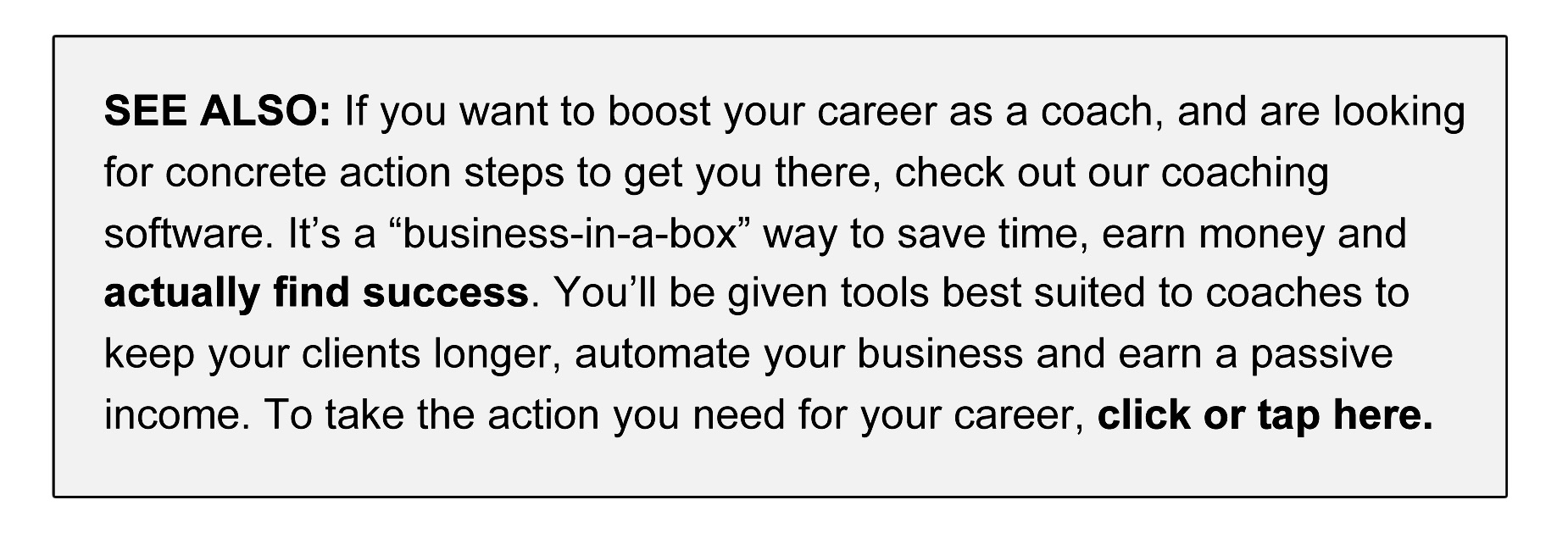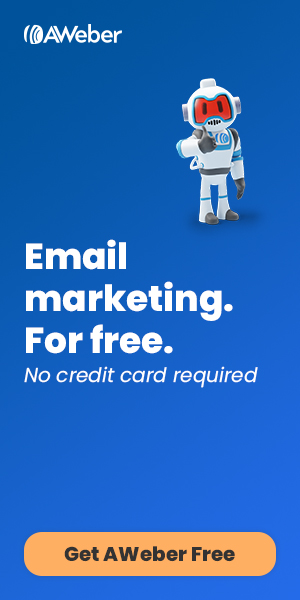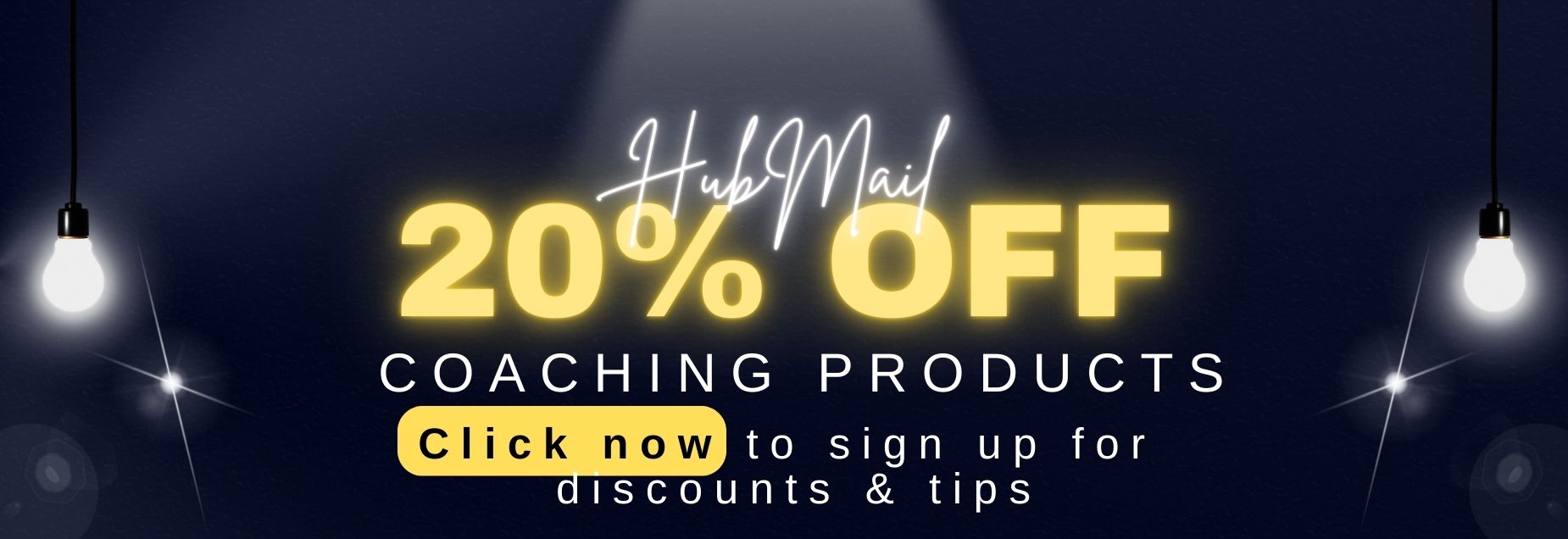
Think you know how to build an amazingly successful coaching business? Here's the TRUTH about building a coaching business.
The truth about building a coaching business
So many coaches believe creating a coaching business is the easiest thing to do only to wake up one day and think that they have failed. Running a business requires not only determination but also the willingness to change.
A coaching business is like any other business. It requires you to do the following:
- Buy products and services
- Sell your own services
- Finance your business
- Manage the day to daily tasks of your business
- Manage your own finances
- Asking for payment and so forth
If you think you could just sit in hotel lobbies, sip coffee and get paid to talk to somebody then think again.
This may be the ultimate dream, but for many coaches this is not happening.
Heck, I was one of them when I started. I thought this is going to be a walk in the park. All I need to do is sit down and have a chat with somebody and make a few hundred quid an hour. Yay me, I thought.
Boy, was I wrong. My coach trainer made it look so easy and simple. All I wanted to do was to get away from my day job. No longer working for the man. No longer working in sales and getting paid a fortune.
Here is my story of how I made my coaching business a success, and the concrete lessons you can apply to your own coaching business.
My story....
FIrst, I figured out what kind of coach I wanted to be (and it wasn't what I expected)
First, I figured out quite quickly that the coaching I wanted to do was not for me at all. In the beginning I wanted to be a life coach, using spirituality and the law of attraction to make this work. When I started my coaching diploma, I thought I had it all figured out. But I realised quite quickly that this was not for me. On a different note, I have started coaching a few businesses along the way (it was all part of the training to become a coach, some pro-bono work).
Then I finally found my passion.
- It was something I've done my entire life. Sales and customer service coaching.
- Combined with consulting people on their business I realised that getting away from the one thing that I wanted to leave behind (selling) was the one thing that I could talk about with people for hours.
- The one thing I was really good at.
- So, my previous hatred for sales (that built up over time working for different companies) became my passion...
...But this still didn't bring in the money that I wanted to make nor did it bring in the customers.
Then I researched, how do coaches actually make money?
It was because of this that I started researching how other “successful coaches” built their business and what I found not only startled me, but it flabbergasted me completely.
Everything they teach of how they became successful was a complete and utter lie. Some of them didn't even make the money that they promised you could make within a few months.
I mean seriously now, have you ever wondered how it is possible that a lot of coaches make six or seven figure incomes when you have coached for years and barely make a living? Is it really that simple to make a few hundred grand a year by coaching just a few clients, working ten hours a week and sipping Margarita's in Tahiti the rest of the time?
Unfortunately, I have to blow the bubble here. For approximately ninety percent of all coaches, this is not the case. And somebody telling you that you can easily make 50 or 100K a month is simply not going to happen, at least not for most of us.
Now having said that, I don't doubt that there are coaches out there who actually make this kind of money or have a super duper lifestyle. But today, I would like to keep it a bit real and tell you how you can make realistically 5 – 10K per month by simply working hard.
Now, if you think this post will open up doors for you and show you the secret of how to earn money the easy way, then please stop reading right now. This post is not for you. Please go visit some of the other places who promise you hundreds of thousands of dollars within a three months period all done through Facebook. I'm certainly not one of them.
However if you are willing to work hard, put the time in to make your business a success, and grow it in a reasonable fashion, then please do stay with me on this.
The first big lessons
Before I get into the nitty gritty details of how you can accomplish building a solid business that will help you do the one thing you love the most (hopefully that will be coaching), I would like to tell you a bit about me and my business.
I started Coach-Clinic in 2013 out of the need that I saw here in Ireland, helping people to grow sales revenue and a much needed upgrade on customer service levels. My first year in business was pretty much a disaster. I made approx. 2,500€ (around $3000). Now, it wasn't a failure as I did learn some very big lessons.
- Nobody was jumping out of their seats when they heard that I had the solution to help grow sales revenue.
- Nobody will come to your office or call you based on a few posts you do on Facebook, your website or any other online tool you may use.
Now, I have to clarify here. I didn't have the money to put thousands or even hundreds of dollars into marketing and advertising my business. In fact, I had a 100 Euro budget per month (approx. $120) to get started and I set this budget for six months. So, my first business deed I did was to get 250 business cards printed for approx. 40€ ($50). When they arrived, yay me, I was in business. But more on that a bit later.
My first year in business was pretty much planning and organising things around. I build my own website (not everybodys’ preference but if you have no money to invest in a nice highly paid outsourced website designed by the worlds best web designers, then you have to do it DIY).
I started up a Facebook page, Twitter page and updated my LinkedIn profile. I went for my first training on how to use those online tools (sponsored by the local Enterprise board) and I started blogging.
So, most of my time was spend designing, redesigning, writing, rewriting, posting, re-posting and tweeting. And after months of doing all of that consistently, I noticed that I didn't get one client out of it. Not one.
Now, some people might say, yeah, because you didn't advertise properly and invest money in advertisement. And you are right, I didn't... I invested my time, sweat and mind into building up the business... well building it to nothing really.
Creating my first coaching business plan
Then it dawned on me. The one thing I haven't been doing was actually going out and meeting some potential customers. That's when things started to change for me.
I have to say, it didn't change immediately. I still took my time to plan certain things.
One of the main things I did (which I hadn't done before) was to finally create a business plan.
This plan helped me to not only get organised but to understand my business, create my vision and help me find my ideal clients. A focused target market was something that I needed. And finally after nearly one year of hard work (of making no money whatsoever...) I got my first client.
My second year in business and the 10K mark
My second year in business started well. I had clients and I could finally prove that what I have is actually working. I've sold my services cheaply. Very cheaply. If anybody thinks that I made tens of thousands in my second year, well, let me tell you it was close to 10K. But from the first year, I've nearly quadrupled my sales revenue, so yay me. I worked hard for that 10,000€ ($11200) and many people told me it's not worth it.
For me, it was. It was the best feeling in the world, finally making some sort of money. And everything I did was now working for me. My first fifteen clients all made their money with the service I provided. Many of them doubled their sales revenue with some even tripling it. However, I also had failures. Some didn't take the consultation advice on board and all it did for them was wasted money, as well as their time and mine.
What I do is not for everybody and it certainly is not for the faint hearted. But even those failures helped me to define my target market even further. I knew now that there are some businesses that cannot be helped, at least not by me.
Breaking the 50K mark
Everything changed again in 2015 when I finally broke the 50K mark in revenue. We finished the year with 58,000€ ($65,000). This year all our clients except one doubled or tripled their sales (a total of ten clients in 2015), and we continue on this success as we grow the business.
The one client who didn't double sales revenue made roughly forty percent more than in his previous year. The reason? He took his sweet time implementing some of the ideas that we talked about. However, he became the highest ranking sales agent of his company and that came with some nice benefits (achieving lifetime membership of the MDRT three months before his usual qualification - Million Dollar Round Table, which is in recognition for only the best insurance people).
A coaching business filling itself to the brim
Now, January of 2016, we've made 85,000 Euros simply because of the previous two years of hard work. Because word was now spreading that we actually helped our previous clients to grow their sales immensely, and we put a little bit of marketing out there to promote our exclusive “Double your sales within twelve months” programme, we opened up the first quarter for 2016 for only ten clients.
We filled all spots by the third week in January. Our next opening will be beginning of April and I reckon that it will fill up soon as well. We only take a maximum of ten clients on per quarter. Having said that, it might not happen, but at least we have nearly achieved our original target which was to double last year's revenue.
how did it all really happen?
The big question is, how did I get to the point to actually making money and making a living for my family?
It's hard work. Selling services, taking every opportunity to put myself out there. Here is a short list of things I have done:
- I created a letter marketing campaign (I listed a hundred companies that I wanted to work with and sent them a letter, customised to their needs).
- After sending a physical letter I followed up with a phone call, simply asking if the letter was received and started a conversation.
- I offered a free customised consultation report to show what I could bring to the table, how I understood their business and what could be done to grow sales and improve their service.
- I also offered free workshops and invited people that I knew and asked them to bring a friend.
- My next meeting was then combined with a free consultation, going through my report which took me nearly two days to complete per client. Combined with an offer to work with me.
- The signing up of the client was the next step.
After I did all of the above, I signed up my first few clients. Out of the hundred companies that I had contacted by post first and followed up after, thirty-eight agreed to a meeting and thirty-two meetings actually happened. I signed up fifteen clients through my approach.
Recognizing our strengths
Now the big hurdle came. Once they signed up, I had to invoice them, asking for money. This was the one thing I always dragged out because I wasn't really good at it, so I got my wife and now business partner to look after payments. She's a tough cookie, exactly the person I needed to help in the business.
If somebody doesn't or didn't pay on the day the programme started, then I simply wouldn't return until payment was received and the wife cleared it. I know what some of you may think. Why wouldn't he ask for payment? You need to understand, that we all have strengths and weaknesses.
Giving is something I love to do, but asking people for money or payment is something I always hated. In fact I still don't like it even after being in business now for over three years. I'm lucky to have a partner who is confident enough in dealing with this crucial business issue.
I did get better though, I do ask people nowadays for payment and have no hesitation to tell them that there is no service from my side if payment is not received. But it just shows that if you don't ask for payment you will always be taken advantage of. It happened to me once and even though we do offer customers to pay monthly it is important to keep on top of it. If I am constantly distracted and would need to worry about getting paid, then my service, the work I do would not be as focused and in the end not only me but my clients would suffer. This, I cannot allow to happen as my clients pay money to receive my full attention.
Another thing I did was join a local networking group and the chamber of commerce. This helped really turn things around for me as I now received referrals, went to networking events and it all started to get a lot easier to make connections.
applying my lessons to your situation
So, the big question is what do you need to make your business work?
1. Define your target market
Don't think that your service is for everyone. You may say, I'm a life coach and everybody can benefit from this service; however, let me assure you that this is not the case. If you drill down into your life coaching skills, you will find the issues you enjoy solving the most with your clients are the ones you can help with the most. This is your target market. Defining your target market is probably one of the biggest steps in getting your business up and running.
To give you an example, a client of mine is solely focusing on helping people de-clutter their homes. Now, she isn't going in and physically removing bags of trash or organising the closet, all she does is coach people and finding ways of how to organise their private homes. She is brilliant at that and made it her core business. She is still doing other life coaching parts here and there but mainly her clients come to her when something in their home or business is building up or needs organising.
So, how much money is in this? Well, I can tell you that she is living her dream, making a living and still has free time on her hands. She serves approximately five clients a week for around $150 per client. And no, she would not even go near trying to sell this as a high ticket item. Her fees are reasonable and her business is growing.
Is she rich yet or does she even plan to get rich? No, she wants to make a good living for her and her children. She still works for approximately thirty– forty hours per week. She is only coaching for five to seven hours per week but her business requires her to put as much attention in it as any other business. If she would just sit back and relax, the business would decline. She is constantly promoting her business and being out there networking.
For roughly earning $800 per week. That's commitment.
The thing is, when she came to me, she barely made $100 a week. Her fees were far too low, and had barely any clients to show for it. And one of the reasons was that she didn't go after the right target market. She believed (like many other coaches) she could help anybody with their life problems.
Once she realised what she really liked to do was getting people organised in their homes and business, she started getting more and more into the habit of talking about her business and how it could solve a simple problem. Now she has a business that makes decent money and she is ready to grow further.
2. Go where your clients hang out
The next step is to look where your clients hang out.
If you target businesses, I can only recommend that you join your local or regional chamber of commerce, a local networking group such as BNI (Business Network International) – it doesn't have to be BNI, I only mention them here as they are known and recognised worldwide.
There are plenty of other local groups which offer networking and business support opportunities.
Research it, and just a tip: Most groups allow you to visit once or twice for free, so make sure you have a good connection with a group and find out as much as possible about them. If you visit three or four groups before making a decision, you will benefit even further as you could simply connect with those people again as they become your (first) prospects.
3. LinkedIn? Think again
If you think you will find great prospects on LinkedIn, then think again. It will take a long time to build relationships but that is ultimately what you need to do with LinkedIn. Keep building relationships.
If you have the money and time to wait for clients to come out of your LinkedIn connections, then great; however, if you want to make it faster, then going to live networking events. Joining a networking group and talking to people will make your business grow faster than you could ever achieve with any online tool.
Don't get me wrong, I'm not saying that there aren’t professionals out there who can make LinkedIn or any other online tool work for them. It never worked for me and no matter what those experts are telling you, it's not as easy as they make it look.
It requires a lot of time and energy and in the end it is all about building relationships. With any relationship, it takes time to build, especially if you don't meet them in person and only communicate through messages and mails.
Personally I believe it is important to do both. You need to have a healthy online and offline approach to your business and if you are consistent, then something positive will come out of it eventually.
4. Free Workshops
If your target market is consumers (or private individuals) you could create a small free workshop and start inviting people that you know and ask them to bring a guest along as well.
It's important to make it clear what they will gain from your workshop. Always include an offer towards the end of working with you. The workshop is there to help you sell your services, make the most of it.
5. Social media
Using Facebook and Twitter is also a good approach for reaching potential customers. However, as with LinkedIn, don't just solely rely on the online tools. Make sure you have a healthy balance of offline and online activity (can't really say it enough).
6. Webinars
​Although this is a new tool for me in my business, I do believe that webinars are a great way to promote any coaching and consultation business out there.
The one thing I would urge you to do is to have a clearly defined offering in your webinars. No matter if they are free or paid. Always have something to sell at the end. This could be an additional service, a product or book or simply a (free?) consultation.
Steps for Reaching out to businesses
1. Write your business letter
Going back to a b2b approach, the next step is to create a letter (physical letter) that you send out by post. Make the letter simple and make sure you stand out. A sales letter should have several aspects included:
- A personalised greeting (Dear John, Hello Mr. Smith etc.)
- A subject line that promotes curiosity (e. g. There is nothing of interest in this letter/ Don't read if you have no interest in x.) Make it compelling.
- An introduction and core message. The first two lines of your letter are the most important ones. Make sure that your core message is within the first two sentences (or lines) of your letter. (e. g. My name is Jane and I'm a specialist in providing x services.)
- The middle part is there to keep the reader interested: “I could go on and on about how my service will change your business or life around. However I don't believe this is exactly what you would like to hear. Therefore I have decided to include a few testimonials of my previous/ current clients to show you exactly the outcome that they have achieved.”
- Add testimonials (one or two is more than enough).
- Closing: “I would like to arrange a ten min meeting with you in order to understand you and your business better and to see if we are a good fit for each other.”
- Call to action (inactive and pro-active): “If you are eager to learn more, please feel free to contact me on number 123-4567-89 (inactive call to action). However I understand that you may not have the time to get back to me, therefore I will contact you in a few days to arrange a meeting. (Pro-active call to action).”
Now, every business is different and of course you probably need to change the above sample to your business needs. One thing you could do is to even go into a bit more detail if you wish, but make sure you talk about your client's business, not yours.
It is vital for your success to follow up on your promise and call within a certain time frame. (three to five days for physical letters, one to two days for email).
2. Set a meeting with the client
Now arrange a meeting. You will hear “No” a lot, but equally if you continue with your letter marketing and follow up calls, you should hear plenty of “Yes” as well.
This will get you the meeting with a potential business customer. It is not guaranteed to sell your products or services yet. It's an easy in. And it's even easier if you are a member of a local (or regional) chamber of commerce and simply use this letter to introduce yourself to other members. The success rate will be even higher of meetings booked.
3. Close the deal
Then there is the final step. How to sign up your next client. This is probably the most difficult part as many people believe that pushing for a sale is simply wrong. I wrote about how “Selling Coaching is a must” previously. Have a look if you would like to learn more on how to close that deal.
Cold calling
Other tools you can use (if you feel comfortable with the phone) is to simply cold call or use a walk-in strategy.
Now, both are tough to do but if you exhaust all your other possibilities then this might just be another option for you. You need to be aware of local laws as cold calling is not allowed anymore in many countries.
There is a way around that by simply asking the other party if it is alright for you to talk to them for a minute or two. But again, please be careful as you don't want to end up with a lawsuit because you are disturbing someone. Private consumers are definitely a no-go on cold calling and door calling.
However, in my opinion, going for business clients is fair game. They had to start somewhere as well and if you actually do the above mentioned letter campaign (or email campaign) then automatically your cold call becomes a (luke-)warm call. If you are nice, forthcoming and upfront with your audience, then you shouldn't have a problem.
In this case you just follow up if they have received it, and this is allowed. A physical letter is better in this case as many people may see your email as spam if they don't know you. Make sure your letter is personalised and addresses somebody within the organisation.
Self promotion
I have also mentioned in previous articles how important self-promotion is.
To keep it short, it is important for people to see who you are. The person behind a letter, a business card, an email. So, always include your picture and contact details in any promotional material that you use or send. Be it on your business card, flyers, brochures, sales and marketing letters and your email. People will remember your face rather than your name.
You can read about it in my 5 Tips to boost your sales.
Setting your fees
As a final note I would like to add a little bit on pricing. I won’t go into too much detail as I will be writing my next article of how to establish the correct price. There is a belief that when you start out your coaching business that you can only charge a low fee.
This is not true.
I have done it and it nearly broke my neck.
And it's not true even though many coaches tend to only charge $25 or $50 an hour. It’s a good way to get started but within a few months you need to up your game and double or even triple the amount.
From experience I can tell you that most people will not appreciate anything you do for them if you don’t charge them properly. They will not see the results because they are not behind the concept.
Money is a funny trigger for people to actually invest the time afterwards to grow. Even though you may charge an hourly rate or have a package deal, selling it cheap will not help you nor will it help your client.
They will simply not engage with any programme.
Now, having said that, there is always exceptions to the rule. If you are targeting unemployed people to coach them for interviews, charging an arm and a leg might also not get you anywhere. But that shows, again, that defining your target market is very important as this can help you establish the correct price for your type of coaching.
If you would like to learn more of how you can finally get your business up and running and making the money you deserve, please feel free to contact me. I promise, I won’t bullshit you around with unrealistic goals and targets. Keep it real and if you are willing to put in the hard work that is needed in any business, let me know. Visit me at www.coach-clinic.com.
To your success,
Carsten
Also check out:
How to make your business stand out from the crowd
Coaching business plans: A quick template
How to set your life coaching fees
How to get past the gatekeeper in sales




















COMMENTS
Ewelina
January 26, 2018Hi! I have an idea for coaching a specified group of people. In my case it would be only a side business because I’m a full-time scientist and I wouldn’t give up my job. I also love public speaking, motivating people and helping them to become more productive.. Nevertheless, I struggle to tackle all my ideas into a clear focused path, thus I’m looking for a specialist who who would be willing to exchange few emails with me to help me out. Would you like to be that person?